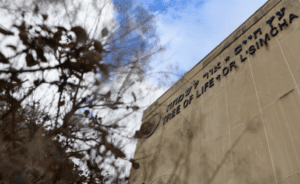
Today is the 4th anniversary of the mass shooting at the Tree of Life Synagogue in my hometown, Pittsburgh, PA. Eleven people were murdered in their house of worship, impacting hundreds and thousands of others in their families, neighborhoods, towns, and countries. Part of the “perfectly horrendous storm” of hatred was fueled by antisemitism, fear of strangers, the easy availability of assault weapons, the lack of availability of mental health treatment, and the perpetration of lies on social media by members of white supremist culture. Before and since then, many other towns have had mass shootings, in schools and churches, malls and movie theaters, grocery stores and day care centers. By now, few places in the US can say they have been spared such atrocities.
To the art of grieving, anniversaries are sacred times of remembrance for individuals when they have experienced the loss of a loved one, and for communities who have experienced a traumatic afront to much they hold dear– the loss of a sense of security and safety, of the ability to move about their neighborhoods freely, to send their children to school or playgrounds confidently.
Remembering that day, it was a Saturday morning. My husband and I were in the kitchen reviewing videos and gathering supplies for a fundraising event we were hosting in the afternoon at a community library. We would be celebrating what our national non-profit Body Wisdom Inc, calls the International Day of InterPlay. We would connect through Zoom with a member of our troupe who was teaching the singing, dancing, story-telling tools of InterPlay to native children in Alaska. We would give a Spirit of InterPlay award to the Legacy Arts Group, a Pittsburgh non-profit that teaches African dancing and drumming to African- American people, connecting them to their heritage. Our day was to be about connection, celebration, and community.
A phone call from my brother-in-law who lives in DC interrupted us. “Are you ok?” he asked, sending us to the television to learn of the shocking massacre of Jewish people as they worshipped at the Tree of Life Synagogue a few miles from our home. We began telephoning Jewish friends and colleagues inquiring, “Are you ok?”
“My children and I had our Bar and Bat Mitzvahs there,” my husband’s golf buddy told him. Roz, a member of our local InterPlay community was a member of that synagogue. The previous night, along with several other members of our group, she was there to celebrate her 70th birthday. She answered my call from her car on her way to Morgantown. “We just heard about it on the radio,” she said, “and we’re having trouble getting details.”
To say, “we are sorry for your loss,” though true is not enough. The response needs to be actions commensurate with the magnitude of the loss. The first Friday after the shooting, the first day that most Jewish people would reenter their synagogues, we called our best couple friends and asked if we might accompany them to their synagogue for Friday night Shabbat service. They welcomed us to join them. It was dusk and the circle driveway was dark as we turned off to park the car. The lot was surprisingly full, and as we walked up the slight incline of a hill approaching the walkway to eventually enter through the front door of the synagogue, we realized we were surrounded by people, lining our path on both sides. The word “solidarity” means “standing with,” and it still brings tears to my eyes as I remember walking through probably 100 people of various ages from the surrounding faith communities as they stood in silence, each holding a lighted candle. It was a vigil to honor the fallen and protect their neighbors right to pray.
Jewish communities are no strangers to hate. In the first weeks after the massacre, survivors from other mass shootings gathered in Pittsburgh to offer support and solace. “My heroes have always been Holocaust survivors,” a teacher from Marjory Stoneman Douglas High School said, “and one of them told me, “’Pain is a terrible thing to waste.’” So, one way to look at anniversaries is to ask the question, what have we done with our pain?
On the first anniversary I noted that there had been no moratorium on mass shootings. Two hundred and fifty-three cities experienced mass shootings that year; in Dayton and El Pasco, San Diego and Christchurch, New Zealand, each stimulating my community’s still tender unresolved traumas, while enlarging the number of people searching for answers to the question of how to heal, individually and collectively. But there had been efforts–community rituals that made it clear an attack on one of our communities is an attack on us all. The art inspired three-star design with the slogan– “Stronger than Hate,” shone back at us from shop windows, billboards, and people’s tee shirts. The 10.27 Healing Partnership had been established with funds from the Federal Government and grief counseling and support were offered to survivors and their families.
On this 4th anniversary, 20 organizations in the Pittsburgh area are hosting days of service in collaboration with the 10.27 Healing Partnership and the Jewish organization, Repair the World. Community building projects include blood drives, clean-up of a Jewish cemetery, and beautification of the grounds surrounding the memorial trees commemorating the 11 lives lost.
Motivated by their pain, people in the Pittsburgh community in collaboration with people in many places around the globe, recently hosted the first Eradicate Hate Global Summit. To develop effective tools that inhibit hate’s creation, growth, and destructive consequences, the University of Pittsburgh and Carnegie Mellon University has established a center without walls, the Collaboratory Against Hate Research and Action Center. https://www.collabagainsthate.org/ By studying how extremism originates and circulates, and how it provokes harmful and illegal acts, the center is helping the grieving community to make sure that this kind of loss doesn’t keep happening to us and to other communities.

